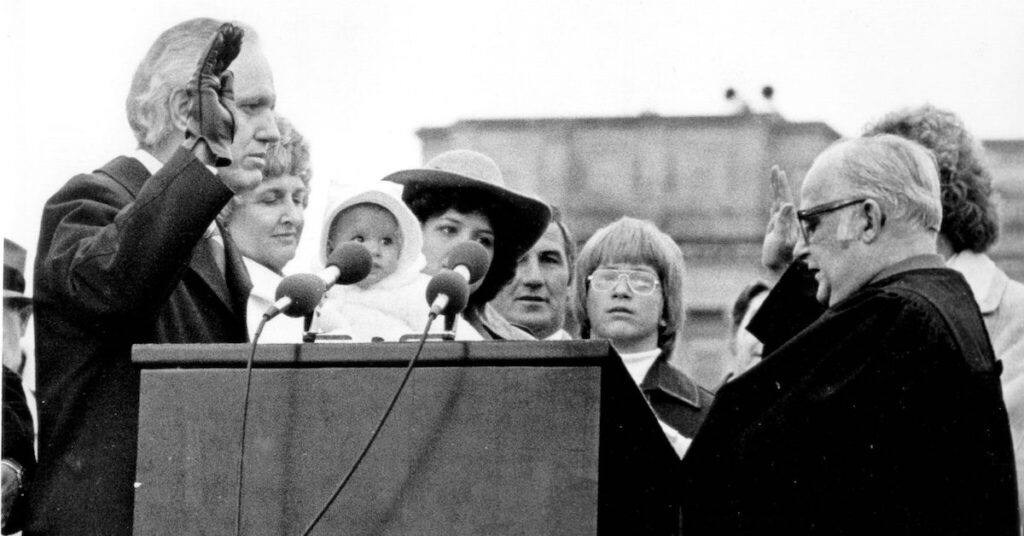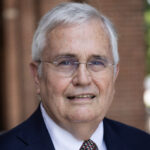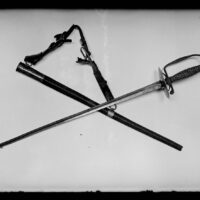Julian Carroll takes the oath of office in 1975. (University of Kentucky Libraries Special Collections Research Center)
Every life has lessons. The life of former Gov. Julian Carroll, which ended Dec. 10, had plenty of lessons in its 92 years, including an instructive narrative in Kentucky political history.
Born in the depths of the Depression, when his big family in McCracken County sometimes didn’t know where its next meal was coming from, he became the last Kentucky governor with lots of money to spend throughout his term in office, and the last one with a compliant legislature, one he had helped run.

Carroll also was the last governor who was a product of Democratic factionalism that was a defining feature of the state’s politics for half of the 20th century. When he successfully changed factions and succeeded, he created a faction of his own, but it was shattered by a federal corruption investigation.
That didn’t stop “the Juice,” the appellation a long-ago reporter gave him, playing on his first name and the zest with which he approached politics and public speaking. He practiced law in Frankfort and was a legislative lobbyist and a state senator, retiring in 2020.
He had one of Kentucky’s longest public careers, one that could be traced to the 1949 Boys State civic-affairs conference, where Carroll was elected “governor” and went on to meet President Harry Truman in the White House. Valedictorian and newspaper editor at Heath High School, he was destined for politics.
Through a Boys State contact, Carroll worked in the law office and 1955 campaign of Gov. A.B. “Happy” Chandler, and backed Chandler in the 1963 primary against winner Ned Breathitt, protégé of then-Gov. Bert Combs. But when Combs ran again in 1971, Carroll agreed to be his unofficial running mate for lieutenant governor. That cost Carroll his biggest law client, Western Kentucky electric executive J.R. Miller, and ruined his relationship with Miller’s political protégé — Lt. Gov. Wendell Ford, who presided over the state Senate while Carroll did likewise in the House, as speaker.
Ford beat Combs, and in another upset, Carroll defeated Attorney General John Breckinridge for the second spot. “Wendell just flat outworked Bert, and I just flat outworked Breckinridge,” Carroll recalled, but he acknowledged that being on Combs’ ticket made a bigger difference. In an interview Oct. 4, he also revealed that he dashed around the state in a car and airplane furnished by his college friend, wealthy horseman Brownell Combs, whom he put on the state Racing Commission when he was governor. Combs was later chairman.
Elected in 1971, Ford and Carroll were factional foes. Governors couldn’t be reelected then, and Carroll wanted to succeed Ford in 1975, but Ford wanted Carroll to run for the U.S. Senate against Republican Marlow Cook in 1974. Carroll stood his ground, Ford relented and beat Cook, and Carroll became governor almost a year before he had planned. He easily won a full term of his own, and thanks to a state budget fattened by a coal boom, the 1976 legislative session was one of the state’s most progressive.
Without increasing taxes, Carroll and the General Assembly created a statewide kindergarten system, made textbooks free, raised teacher pay, created a building program for poor school districts, boosted many state services, and ended the commercial bail-bond system as part of implementing the judicial-reform amendment that voters added to the state constitution in 1975.
Carroll was a master of those issues and the budget, perhaps more than any other governor, but he suffered from hubris, and the legislature chafed under his tight control, finally rebelling in his last year in office. By then, his plan to install Commerce Commissioner Terry McBrayer as his successor was failing due to a federal grand-jury investigation into state contracting and commission-sharing on state insurance policies. Carroll denied wrongdoing, but some of his subordinates went to prison and he invoked the Fifth Amendment to protect himself.
Al Smith, for whose newspapers I worked during almost half of Carroll’s administration, wrote in 2011, “When he was the governor with a pitifully low salary, he accepted favors and bestowed some that were improper. But he was the last New Dealer governor in Frankfort. When he shaped those budgets, he never forgot the meek and the poor.” He still remembered growing up poor with 10 siblings.
Carroll ran for governor in 1987, apparently seeking redemption or vindication. He denied it, unconvincingly, and ran last in the primary. In 2004, he won an open state Senate seat, but after he made an anti-gay remark in 2016 a man who had sought his help produced a 2005 recording in which Carroll asked for sex. Sometimes the pitfall of a long career in public life is that it lasts too long. But he found it hard to quit; few politicians enjoyed politics more than the Juice. May his zest be remembered.
This column is republished from The Northern Kentucky Tribune, a nonprofit publication of the Kentucky Center for Public Service Journalism.
Al Cross is professor emeritus of journalism at the University of Kentucky. He was the longest-serving political writer for the Louisville Courier Journal (1989-2004) and national president of the Society of Professional Journalists in 2001-02. He joined the Kentucky Journalism Hall of Fame in 2010. The NKyTribune is the home for his commentary which is also offered to other publications.






